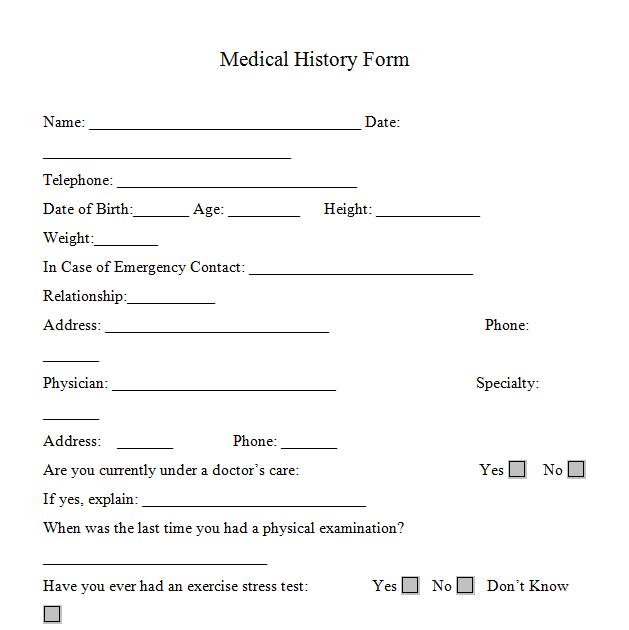Medical History Forms for Personal Trainers
Below are free medical history forms for your fitness business. These forms include a printable medical history form, eating and exercise questionnaire.
You will learn more about your clients medical background and add additional legal protection for your fitness business.
Form Sources:
Personal Fitness Training: Theory & Practice
Get Medical History form in word format and more
Are Medical History Forms Necessary?
It is imperative that you find out your client's medical history before designing any type of training program. Knowing what a person limitations and strengths are will help you design and implement an effective program.
Having a clear understanding of your clients’ medical history with questionnaires and doctors reports will help you avoid putting them in danger. It will also help you to maximize the results.
Steps for evaluating Your client's medical history form
Step 1: Determine the client’s age
Men age 45 or over and women age 55 or over should be cleared by their personal physicians.
Step 2: Analyze CHD risk factors
By definition, a health risk factor is any factor that increases the chance that an individual will develop a disease or condition. The more risk factors a person has, the greater the likelihood that he/she will have or develop a particular disease. Risk factors for CHD indentified by the American College of Sports Medicine (ACSM) .
Initial ACSM Risk Stratification
Low risk
Men <45 years old and women <55 years old who have no symptoms and zero or one risk factor.
Moderate risk
Men <45 years old and women <55 years old who have no symptoms and zero or two risks factor.
High risk
Individuals with one or more potential symptoms of coronary or metabolic disease, or with known cardiovascular, pulmonary, or metabolic disease.
Step 3: Identify potential symptoms of coronary or metabolic disease
According to the ACSM, major symptoms that suggest cardiopulmonary or metabolic disease are:
- Chest pain
- Shortness of breath at rest or with mild exertion
- Dizziness or fainting
- Ankle swelling
- Palpitations or irregular heartbeat
- Cramping pain in legs or feet
- Known heart murmur
Step 4: Ascertain if your client is pregnant
The American College of Obstetricians and Gynecologists (ACOG) recommends that all pregnant clients be cleared for exercise by their physicians prior to starting an exercise program.
Step 5: Other reasons to require a physician’s clearance
Although there are no set guidelines from major organizations, it is advisable to request a physician’s clearance for clients who have been recently hospitalized for any reason, who have chronic or acute muscle or joint injury, or who are on prescription medications.
If a client does not fall into any of above categories, the client is then classed as apparently healthy and does not generally need medical clearance prior to fitness testing or exercise In the event that a client has several risk factors, known disease, or medical complications or injuries, you may decide that your level of knowledge is insufficient to provide the safest monitoring and exercise programming for his/her condition. Know your limitations. It may be more prudent to recommend a cardiac rehabilitation facility or a physical therapist depending on the nature of the client’s problem.


